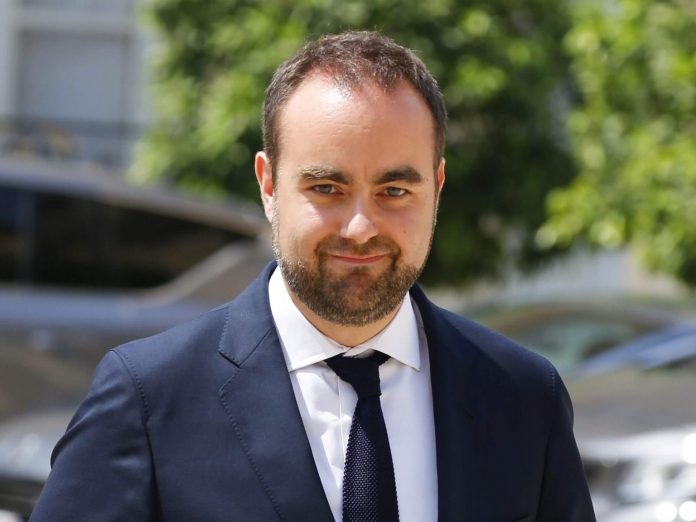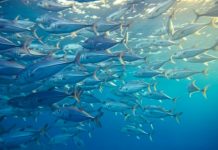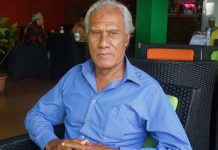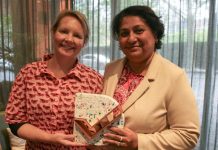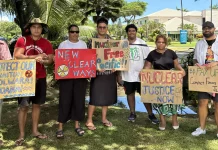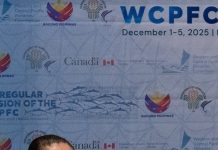By Nic Maclellan
As France’s Overseas Minister Sébastien Lecornu visits Noumea, supporters and opponents of independence are debating whether the next New Caledonia referendum on self-determination should proceed in December.
Key independence parties have long called for the referendum to be held in late 2022 and are pressing Lecornu to defer the poll. Anti-independence politicians believe that the vote should proceed as scheduled, even though campaigning has been disrupted since early September by a surge of Covid-19 cases in the French Pacific dependency.
After previous votes in November 2018 and October 2020, the New Caledonia referendum is scheduled for 12 December. The decision on timing is crucial, as this is the third and final poll under the 1998 framework agreement known as the Noumea Accord. After two close results, with the independence movement edging towards a majority, New Caledonian citizens face a crucial test: whether to vote Yes or No to become an independent and sovereign nation.
Dispute over unilateral decision
The decision on the December date was taken unilaterally by the French government, following discussions at a roundtable in Paris last July. These talks were boycotted by some key politicians, including current President of New Caledonia Louis Mapou, President of the Northern Province Paul Neaoutyine and Senator for New Caledonia Pierre Frogier of the anti-independence Rassemblement party.
At the time, leaders of the largest pro-independence party Union Calédonienne expressed concern the decision about the date was “unilateral” rather than a consensus of the meeting: “The position of the French state does not commit us. It has not been validated by our delegation.”
Overseas Minister Sébastien Lecornu agreed that this was a decision from Paris: “I would like to point out that this date is not the subject of a consensus….It’s not an agreement. It’s an initiative that we are taking within the strict framework of the powers of the French State.”
Even though the referendum is the culmination of more than 20 years transition under the 1998 Noumea Accord, the timing is complicated by France’s domestic electoral cycle. French President Emmanuel Macron is campaigning for re-election in France’s presidential elections in April.
Beyond this, whatever the outcome of the referendum, a subsequent transition period will only last until 30 June 2023. The French government has only allowed 18 months, either to create a new political agreement after a No vote, or – in the case of a Yes majority – to negotiate a new Constitution and economic and security agreements between France and an independent Kanaky New Caledonia.
Since July, both supporters and opponents of independence have launched their referendum campaigns, with most conservative parties joining together as the “Les Voix du Non” alliance. But preparations for the final official campaign have been disrupted by a recent wave of coronavirus infections in New Caledonia.
Due to successful actions since the start of the global pandemic – border controls, quarantine for overseas arrivals, vaccination and more – New Caledonia largely escaped the toll of death and illness seen in France and French Polynesia throughout 2020. But since 6 September this year, there have been 9,977 cases and 241 deaths in a population of nearly 289,000 people. A bulletin from New Caledonia’s official statistics office ISEE reports that “the number of deaths recorded in September 2021, 1.8 times higher than the 2015-2019 average, appears to be quite exceptional.”
On 23 September, the Political Bureau of the main independence coalition Front de Libération Nationale Kanak et Socialiste (FLNKS) issued a public statement calling for the referendum “to be postponed to an opportune date that still needs to be set, until the situation improves and our communities are more serene to express themselves on the future of their country.”
The FLNKS statement said that due to the current wave of COVID-19, “all New Caledonian citizens are not calm enough to participate in a referendum that will affect the future of their country.”
Minister takes the pulse
Over the weekend, the young and ambitious Overseas Minister Sébastien Lecornu held meetings with representatives of the major parliamentary groups in New Caledonia’s Congress. His agenda ranged across the health and economic impacts of the pandemic, options to reopen the community from lockdown and the complex political situation in the lead up to December.
Pierre-Chanel Tutugoro is Secretary General of Union Calédonienne (UC) and told journalists his party reaffirmed the call for delay during Saturday’s dialogue with Minister Lecornu.
“The health crisis has weakened many of our families and challenged our activists about their capacities,” Tutugoro said after the meeting. “Campaigning in the situation today is difficult. Whether you are a partisan of Yes or No, we have everything to lose by wanting to hold this consultation on 12 December at any cost.”
Members of the Union nationale pour indépendance (UNI) parliamentary group, who boycotted last July’s roundtable in Paris, have also told Lecornu that they support a delay in the referendum.
UNI’s Jean-Pierre Djaïwé of the Party of Kanak Liberation (Palika) noted: “UNI’s position is not new. We are opposed to holding this referendum on 12 December …There can be no vote without a campaign. It’s democracy. When we look at the health situation in the country, we told the Minister of our difficulty in being able to reach our communities. At the end of this crisis, we will find a bruised population. It will be difficult for us to reach out to our communities who have something else in mind.”
Other smaller pro-independence groupings, including the Mouvement nationaliste pour la souveraineté de Kanaky (MNSK) and the Mouvement des océaniens indépendantiste (MOI), have also called for a delay of the vote until late 2022.
In contrast, leaders of the main anti-independence coalition Avenir en Confiance (AeC) have criticised the call for a delay. AeC spokesperson Virginie Ruffenach has argued the independence movement is fearful of losing the poll rather than sincerely concerned about the impact of the pandemic. As general secretary of the Rassemblement-les Républicains party, she said that “we must not use this health crisis as a political pretext. I appeal to the separatists: we must meet this deadline.”
Ruffenach said there was no reason to delay the vote, given the current surge of COVID-19 cases has peaked and further delay would dent the confidence of the business community. Despite the need for France to guarantee “the health and human security of this vote”, Ruffenach said it should proceed on 12 December “as a very important democratic event for New Caledonians who must free their horizons.”
After his meeting with Lecornu, the secretary general of the anti-independence party Calédonie ensemble, Philippe Michel, told journalists the decision must be driven by the health indicators, not political posturing.
“If there is an epidemic rebound, too high incidence rates and proven risks on the participation and the sincerity of the ballot, then it will have to be postponed,” said Michel. “We can wait for another three to four weeks, that is to say around 10 November [to set the date]. The real issue now is to carefully monitor the health indicators.”
Different visions of decolonisation
Last week, the largest independence party Union Calédonienne (UC) issued a formal statement on its vision of the pathway to independence, reaffirming its long-standing view that the Noumea Accord must culminate in the decolonisation of New Caledonia.
In a 13 October letter to Overseas Minister Lecornu from FLNKS spokesperson Daniel Goa, the UC President restated his party’s long-term vision that the Noumea Accord is “a process of decolonisation and emancipation, the outcome of which is clearly sequenced by 1) the organisation of three referendums, 2) the irreversibility of the process and 3) ongoing dialogue between partners.”
The UC letter outlines six areas of potential convergence between the State, anti- and pro-independence parties “to bring this decolonisation process to an end.” It outlines the party’s views on: the transition period after a referendum on self-determination; the need to build a post-independence “interdependence” with France; facilitating the transfer of sovereign powers to create internationally recognised statehood; improving economic and fiscal standing; ongoing economic, social and cultural transformation; and shifting from New Caledonian citizenship to full nationality.
Some members of the anti-independence Avenir en Confiance coalition still reject key elements of this vision. However the letter suggests that UC believes future solutions to the impasse will arise from the FLNKS and the French State as the colonising power, rather than amongst New Caledonians.
At this stage, the French government is continuing to organise the logistics of the looming poll. Last week, 250 French gendarmes and police officers arrived in Noumea from Paris, the first contingent of more than 2,000 police and military who will be deployed around the country in coming weeks.
Visiting police headquarters in Noumea last week, Lecornu said that the police contingent was larger than the two previous referendums, but was necessary to maintain security for the vote as well as “public order the day after the vote in case some radicalised minorities decide to break the law.” Justifying the large deployment, Lecornu said: “The state is there to protect its citizens. We are putting the resources in place to do so.”
Lecornu continues his discussions in Noumea this week and New Caledonians must wait to hear whether his unilateral choice of a referendum on 12 December will hold, or whether the vote will be delayed until 2022.
It’s a major strategic decision for France, at a time that President Macron’s Indo-Pacific policy is in flux. France’s ongoing colonial role in New Caledonia is a central pillar of this strategy, but Macron’s “India-Australia-France” axis – announced in Sydney and Noumea in May 2018 – has been disrupted by the new Australia-United Kingdom-United States (AUKUS) partnership. The abrupt abandonment of a $90 billion submarine contract between Australia and the French corporation Naval Group has angered Paris, which sees arms sales as a central pillar of French Indo-Pacific policy.
The unilateral decision to set a referendum date so close to the last poll in 2020, in the midst of a global pandemic, raises concern about the validity of such a crucial vote. Supporters and opponents of independence broadly accepted the outcome of the two previous polls and – despite many disputes over voting registration and participation – most leaders accepted the results as free and fair. Given all their warnings, however, will independence leaders agree to participate in the December vote if Lecornu decides to forge ahead?
As UC secretary general Pierre-Chanel Tutugoro noted on Saturday: “We have not used the term boycott and no one has used it until now.” Until now.
SOURCE: ISLANDS BUSINESS/PACNEWS






